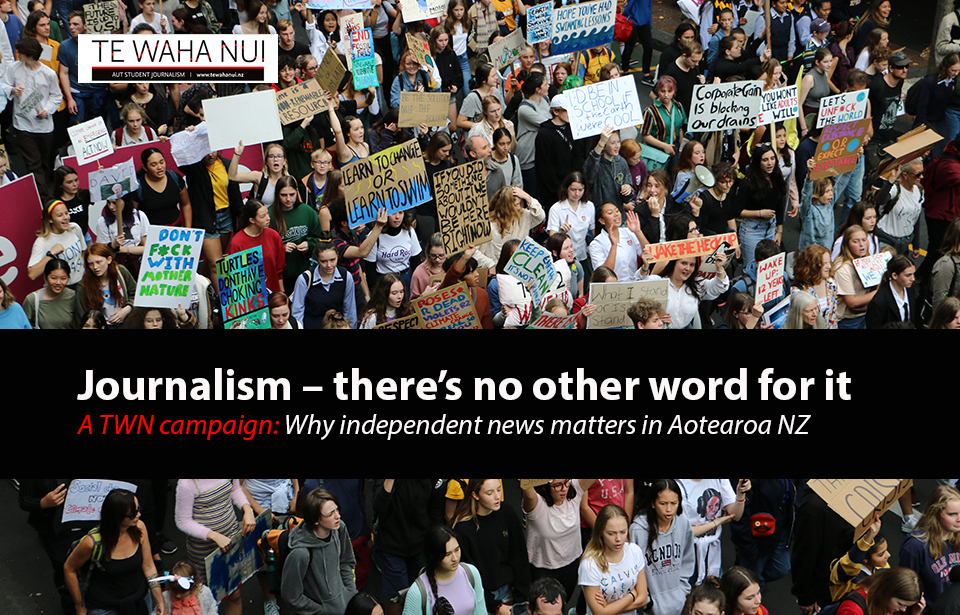News media cuts will damage Asian representation in newsrooms
• May 16, 2024

Asian journalism student viewing RNZ Asia scholarship article. Photo: Regina Tao
Future Asian journalists are steering away from the industry due to Aotearoa’s current media cuts, according to leading journalists.
Victoria Young, BusinessDesk Editor and co-founder of Kiwi-Asians in Media and Communications (KAiMaC), says in such a climate diversifying newsrooms is even more difficult.
“When the newsroom shrinks and things get harder, it's harder to have a diversity of voices.
“Through the [KAiMaC] network…our research tells us that within Asian communities, there's scepticism still over journalism as an industry and that shows instability within the media.
“When there are cuts, it makes it harder for especially people who come from communities or who have maybe parents or expectations upon them that aren't positive towards journalism…to justify their career decisions.”
Young says there is an unspoken challenge in the background of being an Asian journalist of feeling like the ‘other’ in a newsroom.
“I still am a business journalist, so I've started in a male-white dominated area of the news so you're always going to feel a little bit ‘other’ in some of those rooms.
“There are people that are looking at smaller niche publications, which could benefit Asian communities more broadly.”
With mainstream media services such as Newshub and TVNZ’s Sunday announcing their closure Young says there is still an opportunity for change.
“The interesting thing about what's happening with all the media cuts at the moment is that…I believe that from some of this, with a bit of luck, some new green shoots will grow.
“The fact that other titles are hurting and that mainstream media maybe doesn't address specific communities, maybe you know that that's where the opportunity is.”
Manager of RNZ Asia Elliott Samuels says Auckland’s Asian population is forecasted to grow 44 percent by 2043 (Stats New Zealand) should carry over into more Asian representation in the industry.
Samuels believes it is beneficial for news in general to have journalists from different backgrounds.
“There are certain language issues that make it difficult to communicate with certain communities.
“So, if you have journalists who are able to communicate in a language that's comfortable and familiar to them, then you're going to get more perspective from that community.”
The RNZ Asia scholarship, released this year granted two recipients of Asian heritage studying journalism with $8000 tuition paid for and a two-week internship at the organisation.
“Ultimately our objective is to ensure that there's a pathway for promising students of Asian descent into journalism that may not exist.
“Many Asian graduates would probably be looking in other sectors for work because, quite simply, they offer more money in terms of salary and long-term prospects in terms of a career.
“Journalism by nature isn't one of the highest paying in society, so we wanted to produce something that was attractive enough for promising students who can come into journalism to provide that voice and perspective in their reporting.”


Whakatairanga ka tika, whakamaua ngaa mita
AISHA CAMPBELL (NGĀTI RUANUI, NGĀ RAURU, NGĀ RUAHINE, TE ATIAWA, TARANAKI) • October 28, 2025

Supporters hope new council will save Western Springs Speedway
Savannah Lendich Jonkers • October 8, 2025


Whakatairanga ka tika, whakamaua ngaa mita
AISHA CAMPBELL (NGĀTI RUANUI, NGĀ RAURU, NGĀ RUAHINE, TE ATIAWA, TARANAKI) • October 28, 2025

Supporters hope new council will save Western Springs Speedway
Savannah Lendich Jonkers • October 8, 2025
